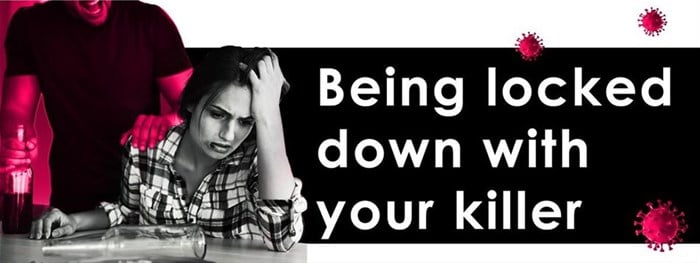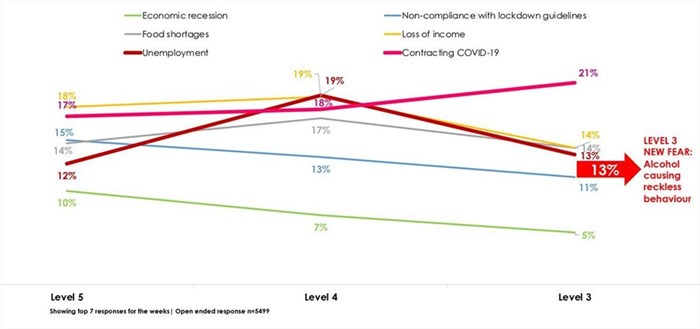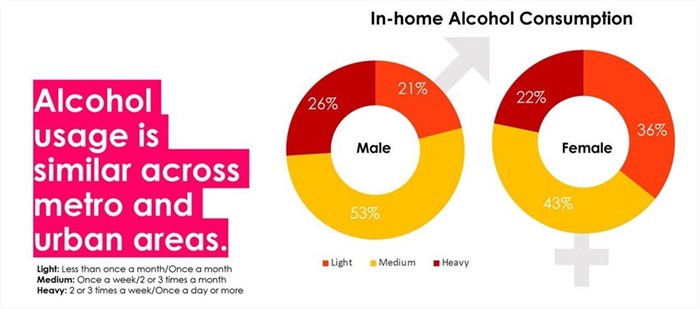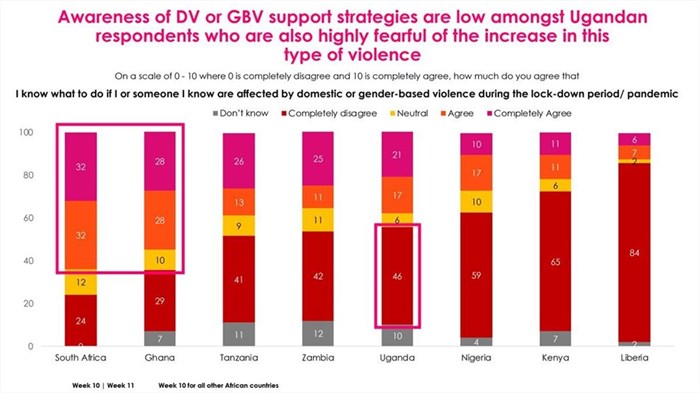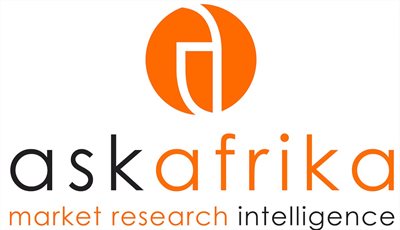“Over the past few weeks no fewer than 21 women and children have been murdered. Their killers thought they could silence them. But we will not forget them, and we will speak for them where they cannot” (President Ramaphosa, 17 June 2020).
This wave of domestic violence has uncovered other contributing socio-economic factors like unemployment and poverty. Although poverty is not a direct cause of domestic violence, it can be an aggravating factor where domestic violence already prevails (Africa poverty Report, 2016). The severity of violence against women and children has heightened and the statistics according to the Saps (South African Police Service) has shown that since the beginning of June 2020, after the unbanning of alcohol legalisation, there has been a drastic increase in violent crimes committed against vulnerable women and children. Alcohol abuse may therefore exacerbate the occurrence and severity of domestic violence.
The Ask Afrika Covid-19 tracker interviewed a representative sample of 4,898 South Africans for the past 11 weeks, tracking the socio-economic impact of the virus, the lockdown and gradual re-opening of the economy. In addition to the South African sample the Ask Afrika Covid-19 tracker’s fieldwork extended to seven African countries namely, Tanzania, Uganda, Zambia, Nigeria, Kenya, Ghana and Liberia with a sample size of n = 2,510.
Fearing alcohol-induced bad behaviour is second only to the fear of contracting Covid-19 in South Africa
The Ask Afrika’s Covid-19 tracker revealed that a quarter of those who ran out of alcoholic products bought or obtained these products during the lockdown, which they mainly sourced from friends thus creating a new fear of reckless behaviour caused by alcohol availability. As the biggest concern (21%) facing our country remains the fear of contracting the virus, 13% of respondents fear that the unbanning of alcohol sales will lead to irresponsible and aggressive behaviour. This fear is currently the fear only second to contracting the Covid-19 virus. All other measured fears like unemployment, food shortages, loss of income, con-compliance and the economic recession are less than 15%.
South Africans are one of the top five heaviest drinking nations in the world
Ask Afrika’s TGI 2018C data compliments WHO (World Health Organisation) statistics and revealed that 34% of South African consume alcohol. Alcohol usage amongst males remains significantly higher than South African females. At least 53% of males will consume alcohol once a week and 26% consume alcohol two to three times a week.
Many have flocked to the stores to stock up on alcohol as it was revealed that one in two of the respondents indicated that they bought alcohol when the level 3 unbanning of alcohol came into effect. A female respondent showing her dissatisfaction to the unbanning of alcohol bravely stated: “I think they went too far by opening the liquor stores, people are already all over the street doing nothing. I think this will cause a high risk to get coronavirus. People get so irresponsible when they are under the influence of alcohol.”
Two-thirds of the respondents voiced their concern about the increase of domestic and gender-based violence. Recent results from the Ask Afrika Covid-19 tracker indicated that male abusers also fall within the demographic group of significantly higher alcohol usage figures when compared to other demographic groups. The direct link between alcohol abuse among men and gender-based violence, needs to be addressed and not just discussed in public forums.
Currently, South Africa is facing two catastrophic pandemics, Covid-19 and gender-based violence (GBV). GBV is a profound societal issue, which is systemic and deeply embedded in diverse cultures, traditions and institutions found in South Africa. Ask Afrika’s Covid-19 tracker revealed that the unbanning of alcohol sales has fueled women’s fears as they are concerned about the increasing gender-based violence numbers.
Ask Afrika’s TGI data indicates that males are considered heaviest drinkers. Multiple studies have echoed this indicating that there is a link between alcohol consumption and gender-based violence. Gender-based violence knows no race, class, age or status and it is caused by ordinary preparators. As Oprah Winfrey affirms: “She lived — as we all have lived — in a culture broken by brutally powerful men.”
100% of tobacco sales during Lockdown were illicit
Although the banning of both alcohol and tobacco sales caused a furore in our society with regards to human rights and constitutional rights, 74% of respondents agreed that the ban on alcohol and cigarette sales has greatly increased illegal trading within their communities. Another 25% of those who ran out of alcohol, managed to buy these products during the lockdown ban illegally. Many people engaged in illicit trade and it caused another boom in the illegal trading industry of tobacco and alcohol.
Telita Snyckers, author of Dirty Tobacco, revealed that the illegal trade of cigarettes have increased to 35% in 2019 and 100% of cigarettes sold in lock-down is illicit. Snyckers further highlighted the profitability of this industry, which shows profit margins four times more than that of the cocaine trade. Ask Afrika’s data suggest that very few (only 3% of private citizens) financially benefited from the illegal trade, while Snyckers’ data indicates that both multi-nationals and illegal manufacturers are reaping colossal economic benefits before and during the lockdown. A mere 13% from our sample bought or sold cigarettes illegally during the strict lockdown rules.
African leaders appear to have no care for GBV victims
As there has been a significant increase in crime and violence against women and children, this has been prioritised and has been stamped with a sense of urgency by the presidency. President Ramaphosa recently stated that, due to the uncontrolled violence against women and children, “we will also need to look at further, more drastic measures to curb the abuse of alcohol.” Thus, confirming that alcohol abuse is a facilitating factor towards domestic violence. This is particularly important as just over two-thirds of the respondents feel that the government should be showing more support and attention towards domestic and gender-based violence. It is clear that not enough has been done to curb this social ill. Abused women and children are silenced most of the time. In South Africa, gender-based violence has reached immeasurable levels - not a day passes without rape and femicide appearing in headlines.
When it comes to helping these victims, the African countries section of the Ask Afrika Covid-19 tracker showed that South Africans and Kenyans are most likely to believe that crime increased during the lockdown period. A third of Ugandan and South African respondents agreed that domestic and gender-based violence increased during lockdown.
Alarmingly, only one in 10 respondents stated that they have complete trust in their local police forces to keep them safe during the lockdown period. Awareness of domestic violence and gender-based violence support strategies are the lowest amongst Liberia, Kenya, Nigeria, Uganda, Zambia and Tanzania respondents.
A public appeal by 112 academics, researchers and members of civil society has been signed to suggest urgent policy measures to curb the abuse of alcohol linked to gender-based violence. The appeal, with its growing list of signatories, has been sent to the presidency and other members of government, in an earnest attempt and in the hope of gaining media interest. This pandemic, which dictated lockdown rules including the ban on alcohol sales could be viewed as a blessing in disguise. It has placed a spotlight on domestic violence and its strong ties to alcohol consumption which fuels anti-gender-based violence movements. This crisis climate has placed a great emphasis on several societal issues that have been part of the fabric of our society, especially the exposure of women and children to violence and abuse. The state is the ultimate enforcer of Human Rights (Currie & De Waal) and as ultimate law makers can not only address crimes against women and children with “harsher minimum sentences”, but also review public outcry in the form of research, petitions as well as courtroom facts in order to “curb the abuse of alcohol”.
Abused children become the perpetrators of the future
It is known for many years that a vast majority of incarcerated felons have been victims of physical abuse and neglect. Research has shown that victims often become offenders, specifically for boys that have been victimised and molested at a young age, becoming offenders themselves as adults, abusing women and children. https://journals.sagepub.com/doi/10.1177/1524838016659487 https://www.ncjrs.gov/pdffiles/fs000204.pdf
"Child maltreatment roughly doubles the probability that an individual engages in many types of crime. This is true even if we compare twins, one of whom was maltreated when the other one was not." (Curren, Tekin, June 2020) https://www.nber.org/digest/jan07/w12171.html
As President Cyril Ramaphosa says: “These acts of violence have made us doubt the very foundation of our democratic society. Violence against women has become more than a national crisis. It is a crisis that requires us to strengthen our resolve to end all forms of violence and abuse perpetrated by men against women, whatever that may take.”
One tends to swing the pendulum to the side that typically embraces the idea that a domino effect seems to prevail from unemployment and poverty to alcohol abuse and, ultimately, to gender-based violence. As a South African society, we have come a long way from the Apartheid regime, raising our children to respect all people regardless of colour.
In 2020, we need to support and empower vulnerable women to speak up and report their abusers, as Winfrey highlights: “For too long, women have not been heard or believed if they dared to speak their truth to the power of those men, but their time is up.”
The call now is for all South Africans to unite around enjoying our liberty in consuming alcohol, never forgetting the responsibility that goes with it. Children follow the example of adults, as a society and as a collective we must teach them to have respect for women and children, to make them better parents and role models to their children.
For more information on Covid-19 research opportunities please contact:
Andrea Rademeyer
CEO and founder: Ask Afrika (Pty) Ltd
Email: az.oc.akirfaksa@reyemedar.aerdna
Web portal: www.askafrika.co.za
About Ask Afrika
Ask Afrika is a decisioneering company. We support our clients’ decisions through facts. Our clients’ decision requirements are around social research and philanthropy, Experience measures and advisory and brand dynamics.
Social research decisions are required around HIV/Aids and most recently Covid-19. Educational and early childhood development, fair-trade shopping, media and financial research- are some of the areas we love to work in. NGOs, public and private sector clients work with us to get the pulse of nations.
Besides being decisioneers in brand and customer experience research, Ask Afrika is well known for creating some of the most useful, go-to industry benchmarks, including the Ask Afrika Orange Index®, the Ask Afrika Icon Brands®, the Ask Afrika Kasi Star Brands and the Target Group Index (TGI). Ask Afrika’s knowledge of brands is extensive and the Target Group Index (TGI) survey; which measures psychographics, service, products, media and brands- has been used by the majority of the top 50 advertisers and media owners in South Africa for nearly two decades.
Our clients operate across various industries; including retail, telecoms, finance, and the public sector. We offer tailor-made and ready-to-use offerings for all our clients regardless of the size of project.
We are brave, agile, vibrant and experimental. We apply deep thinking and are great in everything we do, to make an impact that matters.
With us, you can make game-changing business decisions confidently.














































